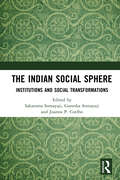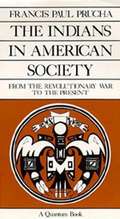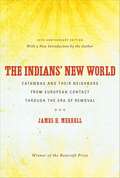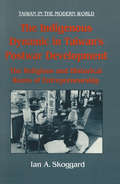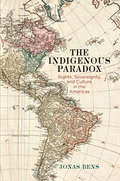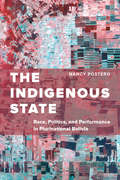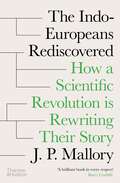- Table View
- List View
The Indian Partition in Literature and Films: History, Politics, and Aesthetics (Routledge Contemporary South Asia Series)
by Debali Mookerjea-Leonard Rini Bhattacharya MehtaThis book presents an examination of fictional representations, in books and films, of the 1947 Partition that led to the creation of the sovereign nation-states of India and Pakistan. While the process of representing the Partition experience through words and images began in the late 1940s, it is only in the last few decades that literary critics and film scholars have begun to analyse the work. The emerging critical scholarship on the Partition and its aftermath has deepened our understanding of the relationship between historical trauma, collective memory, and cultural processes, and this book provides critical readings of literary and cinematic texts on the impact of the Partition both in the Punjab and in Bengal. The collection assembles studies on Anglophone writings with those on the largely unexplored vernacular works, and those which have rarely found a place in discussions on the Partition. It looks at representations of women’s experiences of gendered violence in the Partition riots, and how literary texts have filled in the lack of the ‘human dimension’ in Partition histories. The book goes on to highlight how the memory of the Partition is preserved, and how the creative arts’ relation to public memory and its place within the public sphere has changed through time. Collectively, the essays present a nuanced understanding of how the experience of violence, displacement, and trauma shaped postcolonial societies and subjectivities in the Indian subcontinent. Mapping the diverse topographies of Partition-related uncertainties and covering both well-known and lesser-known texts on the Partition, this book will be a useful contribution to studies of South Asian History, Asian Literature and Asian Film.
The Indian Slave Trade: The Rise of the English Empire in the American South, 1670-1717
by Alan GallayDiscusses very early American Indian slave trade by the British.
The Indian Social Sphere: Institutions and Social Transformations
by Sakarama SomayajiThis book studies the social formation of India through the lens of religion, state, ethnicity, and governance. It provides a nuanced understanding of the structural as well as the processual aspects of the Indian social sphere. The volume studies diverse themes, such as the impact of religiosity on religious consciousness, the primacy of tribal identity in colonial India, political inclusion of marginalised communities, the emerging subaltern activism, among others.An important contribution, this book will be of interest to scholars and researchers of sociology, political sociology, South Asian studies, Affirmative action, and political science.
The Indian Yearbook of Law and Interdisciplinary Studies: Pluralistic Discourse
by Ranita Nagar Hiteshkumar ThakkarThis yearbook focuses on law and its interdisciplinarity in India. It brings together scholars of law, economics, and policy to foster multidisciplinary thinking and analysis across subject areas. The contributors to this volume embody an interdisciplinary spirit through their academic experience and aim to bring to the fore unique suggestions for a better understanding of the law. The volume explores various key issues that are central to state policy demanded by a functioning democracy, in terms of democratic quality, aspirations and sustainability. It discusses global and social issues, such as foreign interference in domestic elections, feminism, and climate change and looks at other subjects such as economics, religion, history, literature from the perspective of law. A unique contribution to the study of law in India, this book will be an essential read for scholars and researchers of law, jurisprudence, political science, economics, public policy, sociology, social anthropology, the Indian Constitution, and South Asia studies.
The Indians in American Society: From the Revolutionary War to the Present
by Francis P. PruchaAmerican Indian affairs are much in the public mind today- hotly contested debates over such issues as Indian fishing rights, land claims, and reservation gambling hold our attention. While the unique legal status of American Indians rests on the historical treaty relationship between Indian tribes and the federal government, until now there has been no comprehensive history of these treaties and their role in American life. Francis Paul Prucha, a leading authority on the history of American Indian affairs, argues that the treaties were a political anomaly from the very beginning. The term "treaty" implies a contract between sovereign independent nations, yet Indians were always in a position of inequality and dependence as negotiators, a fact that complicates their current attempts to regain their rights and tribal sovereignty. Prucha's impeccably researched book, based on a close analysis of every treaty, makes possible a thorough understanding of a legal dilemma whose legacy is so palpably felt today.
The Indians of Canada
by Diamond JennessFirst published in 1932, The Indians of Canada remains the most comprehensive works available on Canada's Indians. Part one includes chapters on languages, economic conditions, food resources, hunting and fishing, dress and adornment, dwellings, travel and transportation, trade and commerce, social and political organization, social life, religion, folklore and traditions, and drama, music, and art. The second part of the book describes the tribes in different groupings: the migratory tribbes of the eastern woodlands, the plains tribes, tribes of the Pacific coast, of the Cordillera, and the Mackenzie and Yukon River basins, and finally the Eskimo.
The Indians of Quetico
by Emerson Coatsworth Robert DaileyA fascinating picture of the industrious life of the Ojibwa before the coming of the white man. The Indians lived in an intimate relationship with the forest and the spiritual forces they found in nature. They were completely dependent on wild game, trees, and plants for their food, their clothing, and their dwellings, and they realized that it was in their best interest to protect these things, to ensure their livelihood year after year and for the generations to come.The author traces the outlines of this Indian civilization—the Ojibwa's social organization, family life, the quest for food, their handicrafts, and the world of the supernatural with which they lived in such intimacy. The result is an authoritative and entertaining account. The book contains 8 photographs, 25 line drawings and two-colour end-paper map.
The Indians of Texas: From Prehistoric to Modern Times (Texas History Paperbacks #4)
by W.W. NewcombAn anthropological history of Native Americans in the Lone Star State.First published in 1961, this study explores the ethnography of the Indian tribes who lived in the region that is now the state of Texas since the beginning of the historic period. The tribes covered include:CoahuiltecansKarankawasLipan ApachesTonkawasComanches;Kiowas and Kiowa ApachesJumanosWichitasCaddosAtakapans“Newcomb’s book is likely to remain the best general work on Texas Indians for a long time.” —American Antiquity“An excellent and long-needed survey of the ethnography of the Indian tribes who resided within the present limits of Texas since the beginning of the historic period. . . . The book is the most comprehensive. scholarly, and authoritative account covering all the Indians of Texas, and is an invaluable and indispensable reference for students of Texas history, for anthropologists, and for lovers of Indian lore.” —Ethnohistory“Dr. Newcomb writes persuasively and with economy, and he has used his material very well indeed. . . . His presentation makes good reading of what might have been a book only for the specialists.” —Saturday Review
The Indians' Book
by Natalie CurtisLore, music, narratives, dozens of drawings by Indians themselves from an authoritative and important survey of native culture among Plains, Southwestern, Lake, and Pueblo Indians. Standard work in popular ethnomusicology. Features 149 songs in full notation. Includes 23 drawings and 23 photos.
The Indians’ New World
by James H. MerrellThis eloquent, pathbreaking account follows the Catawbas from their first contact with Europeans in the sixteenth century until they carved out a place in the American republic three centuries later. It is a story of Native agency, creativity, resilience, and endurance. Upon its original publication in 1989, James Merrell's definitive history of Catawbas and their neighbors in the southern piedmont helped signal a new direction in the study of Native Americans, serving as a model for their reintegration into American history. In an introduction written for this twentieth anniversary edition, Merrell recalls the book's origins and considers its place in the field of early American history in general and Native American history in particular, both at the time it was first published and two decades later.
The Indigenization and Hybridization of Food Cultures in Singapore
by Tai Wei LimThis pivot considers the use of porcelain vessels within multi-dialect cultural spaces in the consumption of cooked food in Singapore. In a place of ubiquitous hawker centres and kopitiams (coffee shops), the potteries used to serve hawker foods have a strong presence in the culinary culture of Singaporeans. The book looks at the relationship between those utensils, the food/drinks that are served as well as the symbolic, historical, socio-cultural and socioeconomic implications of using different kinds of porcelain/pottery wares. It also examines the indigenization of foreign foods in Singapore, using two case studies of hipster food – Japanese and Korean. While authentic Japanese and Korean cuisines find resonance amongst the youths of East Asia, some of them have adapted hybrid local features in terms of sourcing for local ingredients due to costs and availability factors. The book considers how these foods are hybridized and indigenized to suit local tastes, fashion and trends, and offers a key read for East Asian specialists, anthropologists and sociologists interested in East Asian societies.
The Indigenous Dynamic in Taiwan's Postwar Development: Religious and Historical Roots of Entrepreneurship
by Ian SkoggardUsing Taiwan's third largest export industry - shoe manufacturing - as a case study, this work contends that economic development can be tied to Taiwan's own cultural history as well as to the influx of foreign capital or the initiatives of the state government.
The Indigenous Paleolithic of the Western Hemisphere
by Paulette F. SteevesThe Indigenous Paleolithic of the Western Hemisphere is a reclaimed history of the deep past of Indigenous people in North and South America during the Paleolithic. Paulette F. C. Steeves mines evidence from archaeology sites and Paleolithic environments, landscapes, and mammalian and human migrations to make the case that people have been in the Western Hemisphere not only just prior to Clovis sites (10,200 years ago) but for more than 60,000 years, and likely more than 100,000 years. Steeves discusses the political history of American anthropology to focus on why pre-Clovis sites have been dismissed by the field for nearly a century. She explores supporting evidence from genetics and linguistic anthropology regarding First Peoples and time frames of early migrations. Additionally, she highlights the work and struggles faced by a small yet vibrant group of American and European archaeologists who have excavated and reported on numerous pre-Clovis archaeology sites. In this first book on Paleolithic archaeology of the Americas written from an Indigenous perspective, The Indigenous Paleolithic of the Western Hemisphere includes Indigenous oral traditions, archaeological evidence, and a critical and decolonizing discussion of the development of archaeology in the Americas.
The Indigenous Paradox: Rights, Sovereignty, and Culture in the Americas (Pennsylvania Studies in Human Rights)
by Jonas BensAn investigation into how indigenous rights are conceived in legal language and doctrineIn the twenty-first century, it is politically and legally commonplace that indigenous communities go to court to assert their rights against the postcolonial nation-state in which they reside. But upon closer examination, this constellation is far from straightforward. Indigenous communities make their claims as independent entities, governed by their own laws. And yet, they bring a case before the court of another sovereign, subjecting themselves to its foreign rule of law.According to Jonas Bens, when native communities enter into legal relationships with postcolonial nation-states, they "become indigenous." Indigenous communities define themselves as separated from the settler nation-state and insist that their rights originate from within their own system of laws. At the same time, indigenous communities must argue that they are incorporated in the settler nation-state to be able to use its judiciary to enforce these rights. As such, they are simultaneously included into and excluded from the state.Tracing how the indigenous paradox is inscribed into the law by investigating several indigenous rights cases in the Americas, from the early nineteenth century to the early twenty-first, Bens illustrates how indigenous communities have managed—and continue to manage—to navigate this paradox by developing lines of legal reasoning that mobilize the concepts of sovereignty and culture. Bens argues that understanding indigeneity as a paradoxical formation sheds light on pressing questions concerning the role of legal pluralism and shared sovereignty in contemporary multicultural societies.
The Indigenous Space and Marginalized Peoples in the United Nations
by Jens DahlIn the UN, indigenous peoples have achieved more rights than any other group of people. This book traces this to the ability of indigenous peoples to create consensus among themselves; the establishment of an indigenous caucus; and the construction of a global indigenousness.
The Indigenous State: Race, Politics, and Performance in Plurinational Bolivia
by Nancy PosteroAt publication date, a free ebook version of this title will be available through Luminos, University of California Press’s Open Access publishing program. Visit www.luminosoa.org to learn more. In 2005, Bolivians elected their first indigenous president, Evo Morales. Ushering in a new “democratic cultural revolution,” Morales promised to overturn neoliberalism and inaugurate a new decolonized society. In this perceptive new book, Nancy Postero examines the successes and failures that have followed in the ten years since Morales’s election. While the Morales government has made many changes that have benefited Bolivia’s majority indigenous population, it has also consolidated power and reinforced extractivist development models. In the process, indigeneity has been transformed from a site of emancipatory politics to a site of liberal nation-state building. By carefully tracing the political origins and practices of decolonization among activists, government administrators, and ordinary citizens, Postero makes an important contribution to our understanding of the meaning and impact of Bolivia’s indigenous state.
The Indignant Generation: A Narrative History of African American Writers and Critics, 1934-1960
by Lawrence P. JacksonThe Indignant Generation is the first narrative history of the neglected but essential period of African American literature between the Harlem Renaissance and the civil rights era. The years between these two indispensable epochs saw the communal rise of Richard Wright, Gwendolyn Brooks, Ralph Ellison, Lorraine Hansberry, James Baldwin, and many other influential black writers. While these individuals have been duly celebrated, little attention has been paid to the political and artistic milieu in which they produced their greatest works. With this commanding study, Lawrence Jackson recalls the lost history of a crucial era. Looking at the tumultuous decades surrounding World War II, Jackson restores the "indignant" quality to a generation of African American writers shaped by Jim Crow segregation, the Great Depression, the growth of American communism, and an international wave of decolonization. He also reveals how artistic collectives in New York, Chicago, and Washington fostered a sense of destiny and belonging among diverse and disenchanted peoples. As Jackson shows through contemporary documents, the years that brought us Their Eyes Were Watching God, Native Son, and Invisible Man also saw the rise of African American literary criticism--by both black and white critics. Fully exploring the cadre of key African American writers who triumphed in spite of segregation, The Indignant Generation paints a vivid portrait of American intellectual and artistic life in the mid-twentieth century.
The Indirect Estimation of Migration
by Jani Little Andrei Rogers James RaymerThis unique book introduces an essential element in applied demographic analysis: a tool-kit for describing, smoothing, repairing and - in instances of totally missing data - inferring directional migration flows. Migration rates combine with fertility and mortality rates to shape the evolution of human populations. Demographers have found that all three generally exhibit persistent regularities in their age and spatial patterns, when changing levels are controlled for. Drawing on statistical descriptions of such regularities, it is often possible to improve the quality of the available data by smoothing irregular data, imposing the structures of borrowed and related data on unreliable data, and estimating missing data by indirect methods. Model migration schedules and log-linear models are presented as powerful methods for helping population researchers, historical demographers, geographers, and migration analysts work with the data available to them.
The Individual After Modernity: A Sociological Perspective (Routledge Studies in Social and Political Thought)
by Mira MarodyMoving beyond the individualisation paradigm in sociological theory, this book develops an approach to the analysis of human activities and the social phenomena produced by them that centres on the processes that generate coordinated behaviours among individuals. Emphasising the relational and processual character of social phenomena, as well as the importance of a broader cultural and historical context for analysing them, the author questions the view of contemporary society that sees individuals acting in a context in which social bonds are dissolving, and unveils the rationale hidden behind the chaos of everyday activities. Through an analysis of the continued importance of cooperation and the consequent emergence in society of various kinds of communities, this volume examines the changing character of social ties. An overview of transformation of social bonds and the intensification of mutual influences among individuals as they seek to address social dilemmas in new contexts, The Individual after Modernity will appeal to social scientists with interests in social theory.
The Individual Disengagement of Avengers, Nationalists, and Jihadists: Why Ex-Militants Choose to Abandon Violence in the North Caucasus
by Emil Souleimanov Huseyn AliyevThis studydetails the causes and contexts of individual disengagement of various types of militants - avengers, nationalists and jihadists - in Russia's North Caucasus region. It aims to considerably enhance our theoretical understanding of individual militants' incentives to abandon violence. "
The Individualization of Chinese Society (London School Of Economics Monographs On Social Anthropology Ser. #93)
by Yunxiang YanChinese society has seen phenomenal change in the last 30 years. Two of the most profound changes have been the rise of the individual in both public and private spheres and the consequent individualization of Chinese society itself. Yet, despite China's recent dramatic entrance into global politics and economics, neither of these significant shifts has been fully analysed. China may indeed present an alternative model of social transformation in the age of globalisation - so its path to development may have particular implications for the developing world.The Individualization of Chinese Society reveals how individual agency has been on the rise since the 1970s and how this has impacted on everyday life and Chinese society more broadly. The book presents a wide range of detailed case studies - on the impact of economic policy, patterns of kinship, changes in marriage relations and the socio-economic position of women, the development of youth culture, the politics of consumerism, and shifting power relations in everyday life.
The Indo-Aryan Controversy: Evidence and Inference in Indian History
by Edwin F. Bryant andLaurie L. PattonFor the first time in a single volume, this book presents the various arguments in the Indo-Aryan controversy. It also provides a template for the basic issues addressing four major areas: archaeological research, linguistic issues, the interpretation of Vedic texts in their historical contexts, and ideological roots. The volume ends with a plea for a return to civility in the debates which have become increasingly, and unproductively, politicized, and suggests a program of research and inquiry upon which scholars from all sides of the debate might embark.
The Indo-European Puzzle Revisited: Integrating Archaeology, Genetics, and Linguistics
by Kristian Kristiansen Guus Kroonen Eske WillerslevThis book examines the impact of ancient DNA research and scientific evidence on our understanding of the emergence of Indo-European languages in prehistory. Offering cutting-edge contributions from an international team of scholars, it considers the driving forces behind the Indo-European migrations during the 3rd and 2nd millenia BC. The volume explores the rise of the world's first pastoral nomads the Yamnaya Culture in the Russian Pontic steppe including their social organization, expansions, and the transition from nomadism to semi-sedentism when entering Europe. It also traces the chariot conquest in the late Bronze Age and its impact on the expansion of the Indo-Iranian languages into Central Asia. In the final section, the volumes consider the development of hierarchical societies and the origins of slavery. A landmark synthesis of recent, exciting discoveries, the book also includes an extensive theoretical discussion regarding the integration of linguistics, genetics, and archaeology, and the importance of interdisciplinary research in the study of ancient migration.
The Indo-Europeans Rediscovered: How a Scientific Revolution is Rewriting Their Story
by J. P. MalloryA lifetime's study brings revealing expertise to an oft-misunderstood topic in human history—the origin and language of the Indo-Europeans. Today the number of native speakers of Indo-European languages across the world is approximated to be over 2.6 billion—about 45 percent of the Earth’s population. Yet the idea that an ancient, prehistoric population in one time and place gave rise to a wide variety of peoples and languages is one with a long and troubled past. In this expansive investigation, based on more than forty years of research, archaeologist J. P. Mallory navigates the complex history of our search for the Indo-European homeland, offering fresh insight into the debates surrounding origin, as well as the latest genetic research. In this compelling account, Mallory explores ancient migrations, linguistics, and archaeology, applying cutting-edge genetic research to untangle the key arguments with wit and verve. He addresses how the controversial idea of a single, shared homeland has been viewed by scientists, archaeologists, and linguists across the past century and reconsiders how, in the case of the Nazis and more recent nationalist movements, they have been manipulated for political advantage. The author goes on to analyze the linguistic trail linking current populations to the Indo-Europeans, looking at Sanskrit, Greek, Latin, and more, as he traces linguistic origins across multiple peoples and cultures, bringing the most up-to-date phylogenetic research to bear on this story. Ultimately this important volume offers the most conclusive and nuanced understanding of an oft-misrepresented and misunderstood topic.
The Indo-Pacific Theatre: Strategic Visions and Frameworks
by Srabani Roy ChoudhuryThis book studies the internal framework of the Indo-Pacific region and examines the strategic issues faced by the countries that belong to it. Over the years, the Indo-Pacific region has become a prime driver of global economic growth and has generated considerable interest from countries both within and without. The region is now witnessing an intensified great power competition for greater geostrategic space, thus shaping the 21st-century world order. The volume focuses on the emerging strategies of the main actors involved in this competition. It discusses various key issues such as the purpose of the Quadrilateral Security Dialogue and its post-pandemic agenda, the conceptualisation of a Free and Open Indo-Pacific (FOIP) amid an intensifying Sino-US great power competition, the strategies of ASEAN and South Korea, China’s activities in the Indo-Pacific, economic architecture and supply chain disruption in the region, as well as the geopolitical strategy of the European Union for the Indo-Pacific. A crucial study of the Indo-Pacific region in the post-COVID-19 world, the book gives fresh insights into the areas of convergence and divergence in the strategic visions of the many regional actors. It will be of great interest to policymakers as well as students and academics in the fields of political science, international relations, foreign policy, geopolitics, security studies, strategic studies, as well as area studies, namely East and Southeast Asian studies, European Union studies, American studies and Australian studies.


